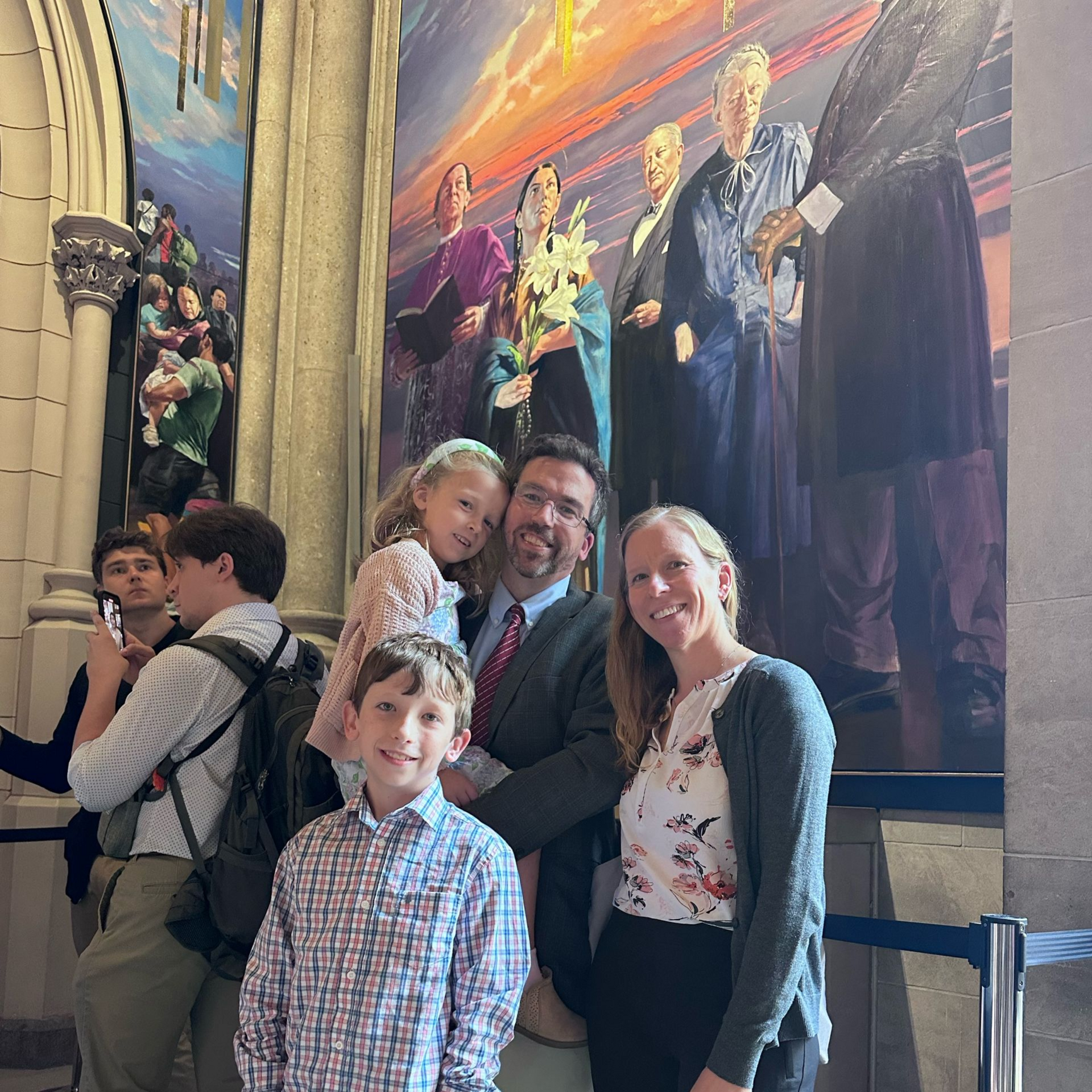Feasting and Great Joy: Merry Christmas from the Dorothy Day Guild!
Merry Christmas from the Dorothy Day Guild!
Dear friends and members of the Dorothy Day Guild,
As Advent draws to a close and we anticipate the Nativity of the Lord, we hope that these are days of joyful waiting for each of you! All of us at the Guild welcome the chance to be in touch with you and to share a few updates, photos, and reflections before the great celebrations of Christmas. Dorothy loved this time of year and celebrated many happy Christmases with her Catholic Worker family and her daughter Tamar and grandchildren in Vermont, “a family where, as in all families, there are grave differences of opinion or points of view, and yet united and happy.” Perhaps one of the happiest of these Christmas celebrations for Dorothy took place in 1970, when Dorothy wrote,
“This has been a time of much feasting and great joy, the return of a grandson from Vietnam, a happy holiday in Vermont, snowed in for a week…The phone rang at nine o’clock and Hilaire got to the phone first. It was he, Eric Dominic Hennessy, Staff Sergeant, Ranger, home from the wars. It took him as long to get from Kennedy airport to Vermont as it did to fly from Vietnam to Seattle. His was the last flight to Kennedy airport in that particular storm, but the buses still ran and got him to Charleston, New Hampshire. It took two hours for his friends to get him from Charleston to Perkinsville what with skidding into snow drifts several times. But at two a.m. on the morning of December 27th, Eric was home again. God be thanked.”
We hope that you likewise are looking forward to feasting and long-desired reunions, and that what follows brings joy and light to your inbox as we await the birth of Our Savior!
Dorothy news:
Catholic Workers and friends from all over the United States and beyond celebrated Dorothy’s birthday on November 8th and anniversary of death on November 29th in ways big and small last month. The Dorothy Day Guild was very proud to co-sponsor the annual Dorothy Day lecture at Manhattan University on November 7th, which featured Jeff Korgen speaking on Dorothy’s life story, her impact on the Church and the peace movement, and her cause for canonization. This is a wonderful lecture series, featuring a variety of perspectives on Dorothy’s life and witness, and we hope to see many of you next year at what will be our tenth annual event!
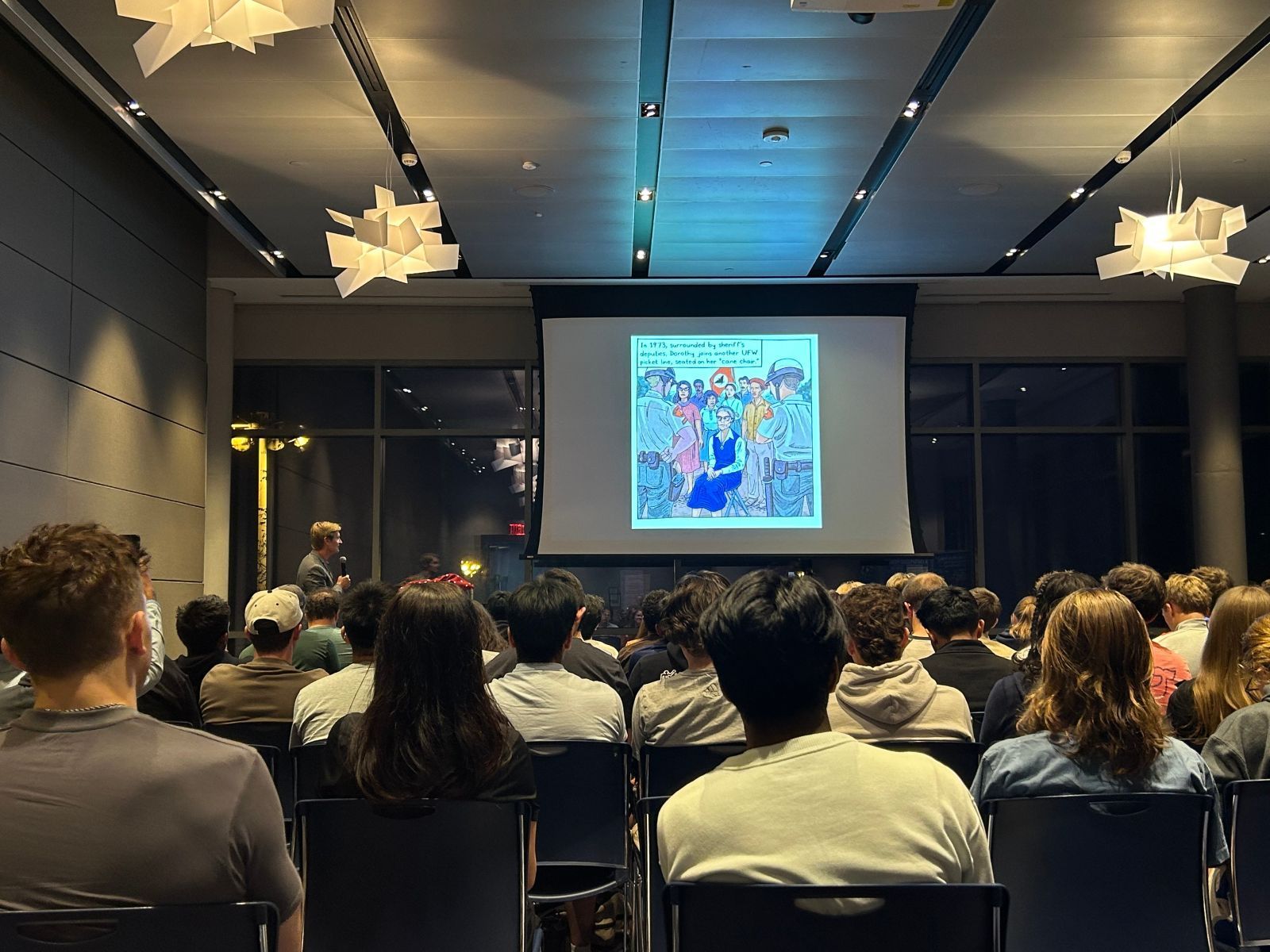
In Washington, DC, the Dorothy Day Catholic Worker community organized a peace vigil on November 9th, where “twenty-one participants read scripture, shared quotes from Dorothy Day, and prayed for peace, with a focus on ending U.S. complicity with Israel’s attacks on the people of Gaza.” As Catholic Worker Art Laffin said, “Now more than ever we need to live and boldly proclaim God's reign of love, justice, peace, and Gospel Nonviolence as we seek to help create the Beloved Community.” Particularly as Christmas draws near, please join us, Pope Francis, and the Dorothy Day Catholic Worker community in praying for peace in the Holy Land and an end to the airstrikes on civilians.

Continuing with our focus on the Holy Land, the Dorothy Day Guild also co-sponsored the Joshua Casteel Memorial Peace Dinner on November 12th at the USCCB meeting in Baltimore. We were so grateful for the chance to connect with friends from Friends of Sabeel North America, an ecumenical organization which promotes peace and justice in Palestine, and for the wonderful hospitality of the Benedictine Sisters of Baltimore, who welcomed us to stay with them at Emmanuel Monastery during our visit.
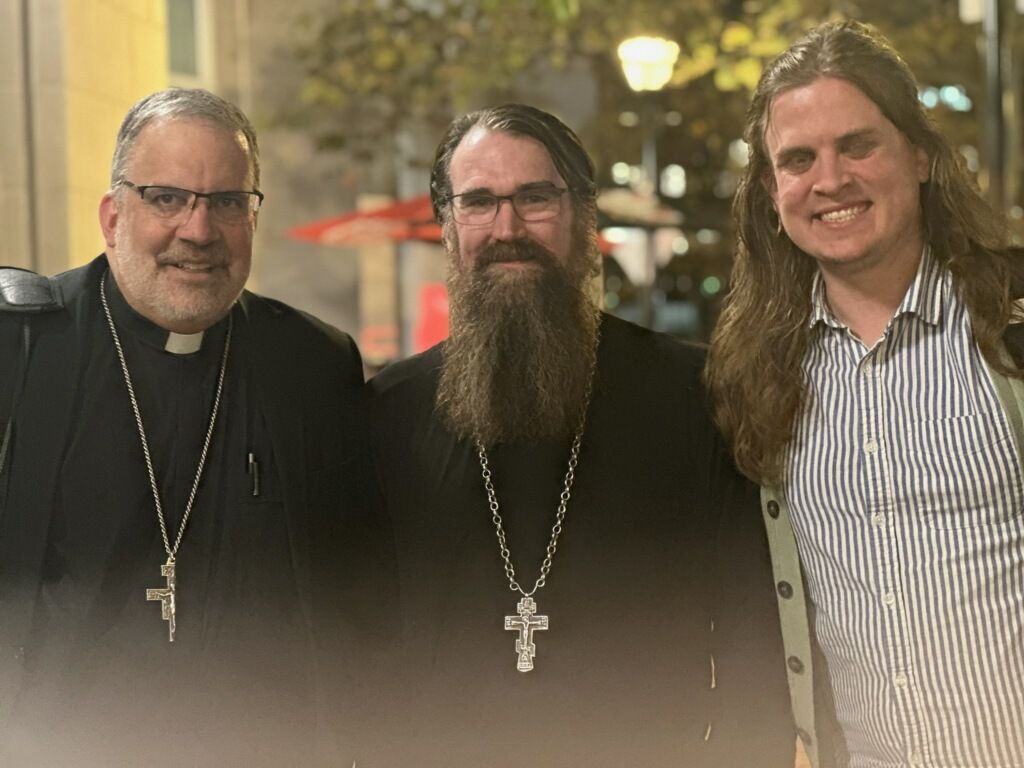
In previous years, our friends at the Catholic Peace Fellowship have organized this event as an opportunity for our bishops to gather for prayer and fellowship and to listen to members of the Church in places around the world which are currently experiencing the devastation of war and armed conflict. This year, we had hoped to invite Palestinian Catholic youth ministers, Mrs. Nadine Bitar and Fr. Louis Salman (pictured below with Cardinal Pizzaballa), to join the bishops for dinner; however, due to the travel restrictions resulting from the war in Gaza, Nadine and Fr. Louis were sadly unable to obtain visas in time to make it to the United States.
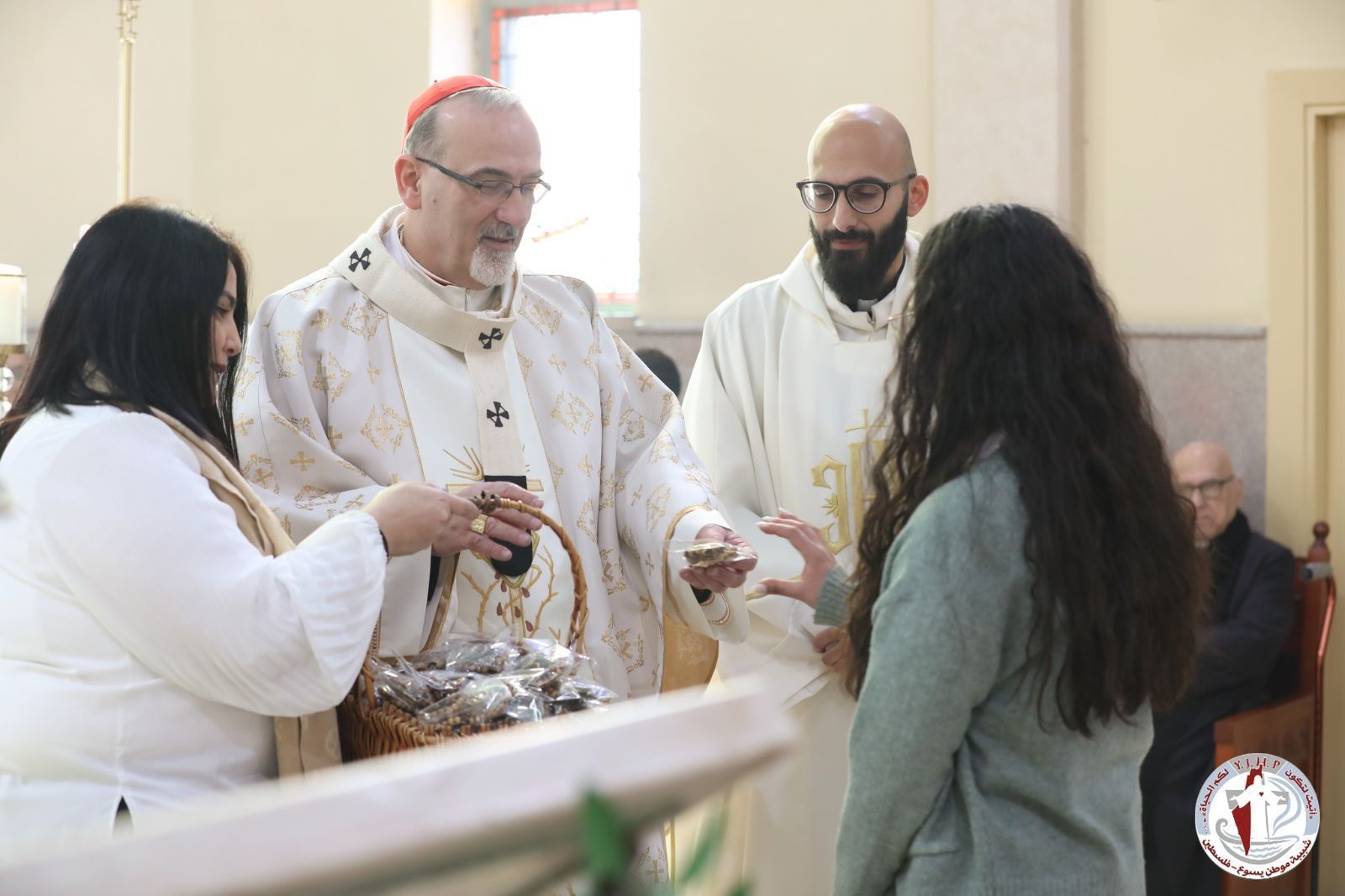
Nadine and Fr. Louis work with Youth of Jesus’ Homeland Palestine, an umbrella ministry of the Assembly of Catholic Ordinaries of the Holy Land, operating under the aegis of the Latin Patriarchate of Jerusalem. In their ministry, Nadine and Fr. Louis represent all the children, youth groups, and young adults of all rites and Catholic Churches in Palestine. Given Dorothy’s life-long concern for the vulnerability of children and her respect for the ideas and contributions of young people, we are confident that she is interceding for the current work of YJHP. Although they were not able to join us in person, Fr. Louis and Nadine wrote a letter which we were able to share with Bishop John Stowe of Lexington and Bishop John Michael Botean, of the Romanian Catholic Eparchy of St. George and their brother bishops, and which we also invite you to read. Speaking of the children and youth in their care, Nadine and Fr. Louis write,
“Despite all the challenges and the brutality of the war, the youth in Gaza—particularly those connected to our churches—continue to hold onto hope. They embody a living faith, showing that even in the darkest times, the light of Christ remains with them. They inspire us with their courage, their faith, and their commitment to remain in the land of their ancestors. Through their small acts of faith, community, and solidarity, they resist the despair that the
conflict tries to impose. These young people remind us of Jesus’ words: “In this world, you will have trouble. But take heart! I have overcome the world” (John 16:33).”
While we were disappointed that Nadine and Fr. Louis could not be with us in person, their words remind us of Christ’s enduring presence among his people and the great hope of the Incarnation. In spite of the wartime travel restrictions, we felt a great sense of spiritual solidarity with Nadine and Fr. Louis, and we remain hopeful that they will be able to join us in the United States this coming spring for a speaking tour in the Midwest and the East Coast. As we enter into the season of Jesus’ birth, please keep them and the children and young people they minister to in your prayers for Christmas.
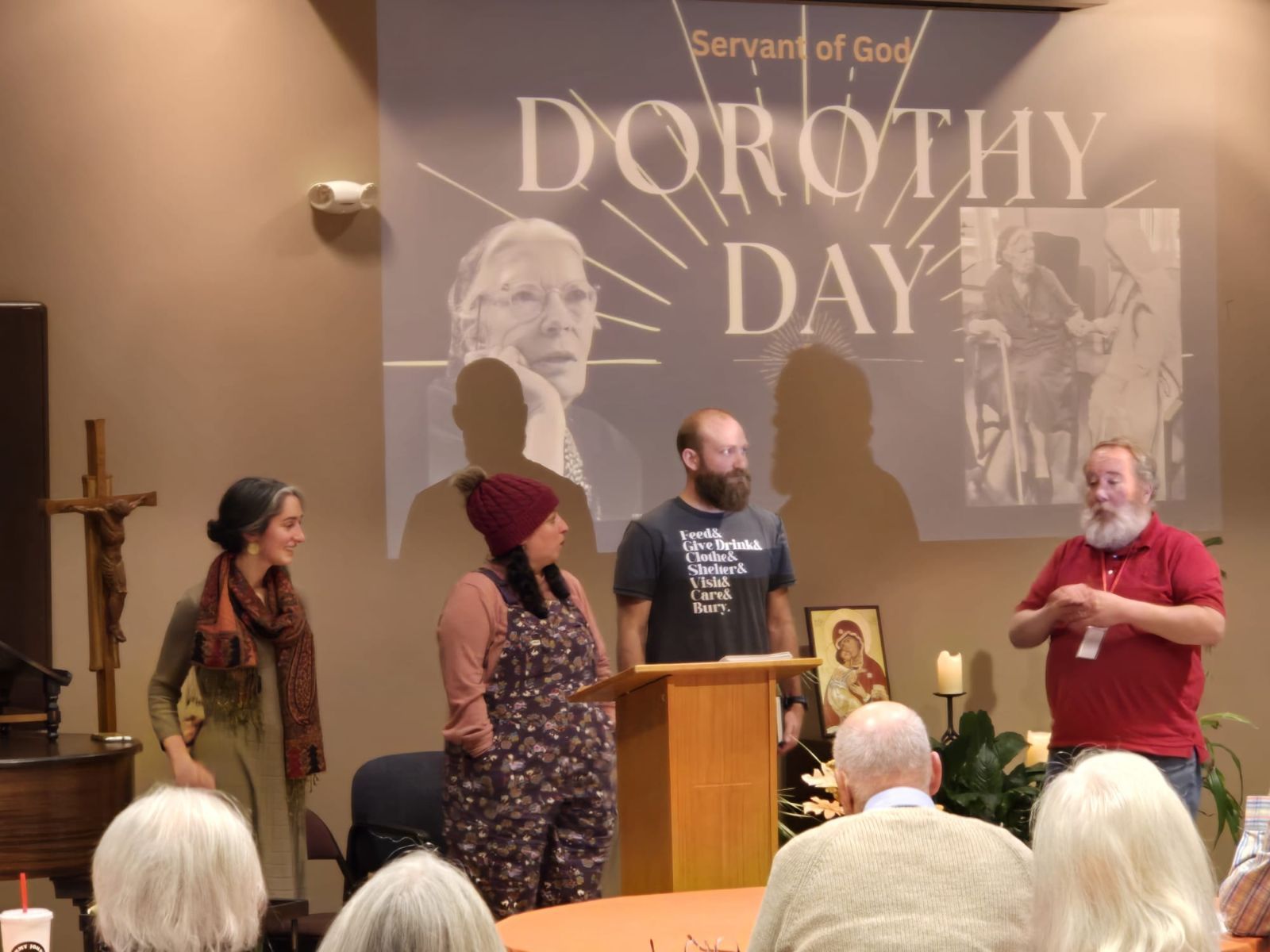
On November 21st, the St. Joan of Arc Parish community in Lisle, IL organized an incredible evening program on Dorothy, which included a presentation on her life and work, sharing and praying with some of her personal effects, and a Q & A with members of different Catholic Worker communities, including St. Peter Claver in South Bend, IN, Nativity House in Lockport, IL, and the Sacred Tent community in Downers Grove, IL. It was such a joy to travel to Lisle and to connect with other Catholic Workers– we felt like we were meeting family we didn’t even know we had! Our enormous thanks go out to Mary Beth Sobolewski and Matthew Zurek for their work organizing this event, and to the entire St. Joan of Arc parish community for their warm hospitality.
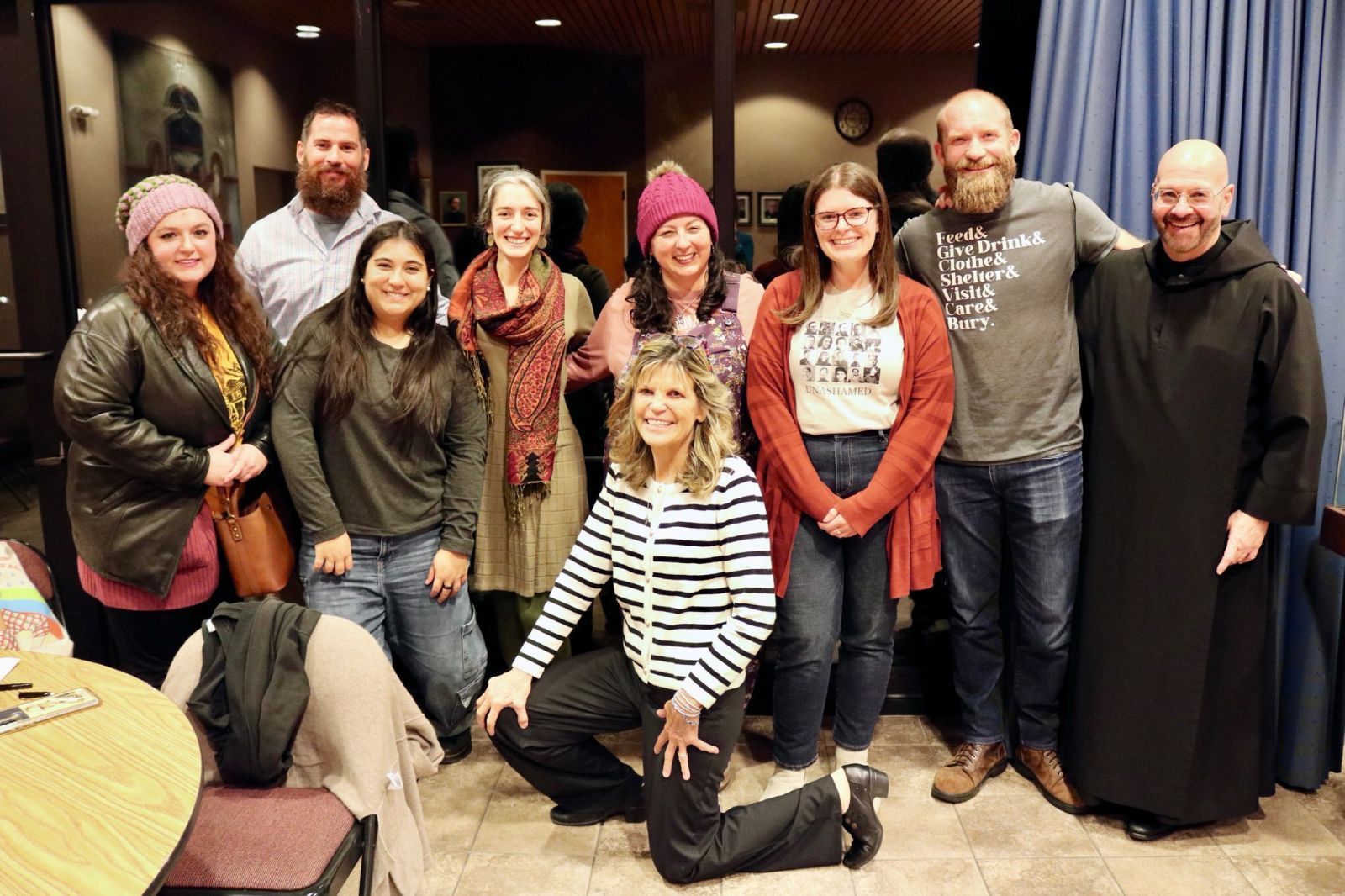
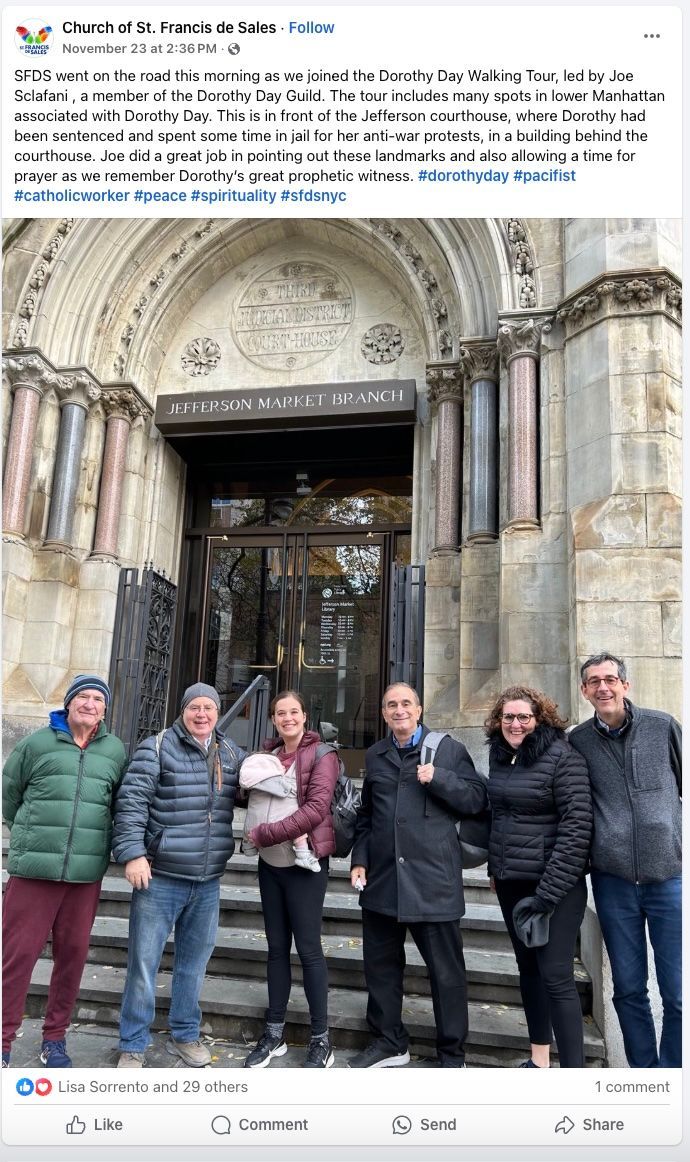
In New York, our annual October walking pilgrimage has been so popular that several members of the Dorothy Day Guild board of directors and advisory committee decided to offer this event more frequently! The weekend before Thanksgiving, Joe Sclafani and Jodee Fink led several small groups of pilgrims through the sites in lower Manhattan where Dorothy picketed, prayed, and offered the works of mercy from the 1920s prior to her conversion until her death in 1980. We are so excited to be expanding our opportunities for you to literally walk in Dorothy’s footsteps, and we are so grateful to Joe, Jodee, and Alex Avitabile for their work on this project.
While the official pilgrimages are on pause for the holidays, we plan to pick back up again in February, so stay tuned for more information on how you can take part in this informative, prayerful, and immersive experience.
Finally on November 29th, our Catholic Worker community here in South Bend celebrated Dorothy’s anniversary of death/future feast day with a special dinner and a visit from her little namesake, a tiny kitten who lived with us for a month this fall before we found her a forever home with one of our friends and regular volunteers. Since this kitten showed up at our low-barrier shelter seeking hospitality, we felt like it was only right to name her after Dorothy– and we think she looks a lot like the kitten the real Dorothy is holding in this photograph from her youth!

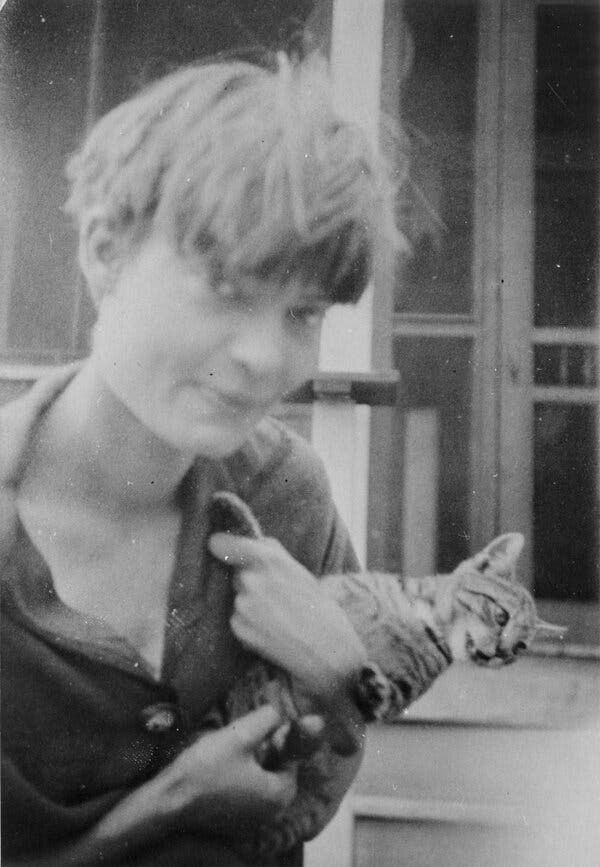
Upcoming Dorothy Day Guild events:
Many of us who work or study at schools and universities have only just wrapped up classes and final exams this week, but the spring semester is right around the corner!
As a reminder, we are accepting submissions for our spring symposium, “Dorothy Day: Practices of Peace in the Year of Jubilee” until January 1st, 2025. We especially encourage Catholic Workers and undergraduate students with an interest in pacifism and Gospel nonviolence to submit proposals. Our symposium organizers will be in touch with everyone who submits a proposal by January 15th, and we’ll have more details on how to register for the symposium available for you in the new year.
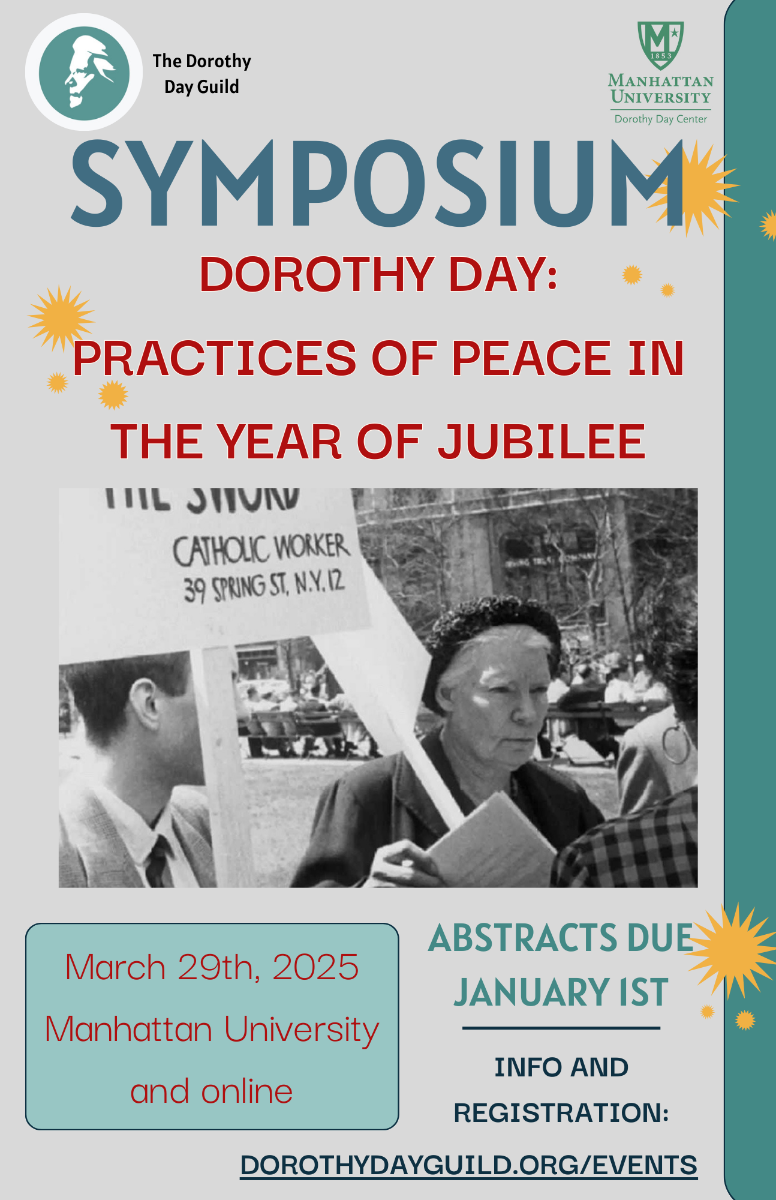
We’re also very pleased to share that the recording of our November webinar, “Dorothy Day and the Saintly Six: Politically-Engaged Holiness in the Present Moment” is now available for viewing on our YouTube channel. This roundtable, which took place in the days following the presidential election in the United States and the closure of the Office for Black Ministry in the Archdiocese of New York, is a hopeful and practically-grounded conversation that looks to American exemplars of heroic virtue for a vision of “this-worldly” holiness. We are so grateful to our presenters, Dr. Kim Harris, Dr. Andrew Prevot, Deacon Mel Tardy, and Joanne Kennedy for their insight and commitment to the works of mercy in the classroom, the soup kitchen, the newspaper office, and the parish. If you weren’t able to attend the live panel, pull up this wonderful discussion for some inspiration on a cold night!
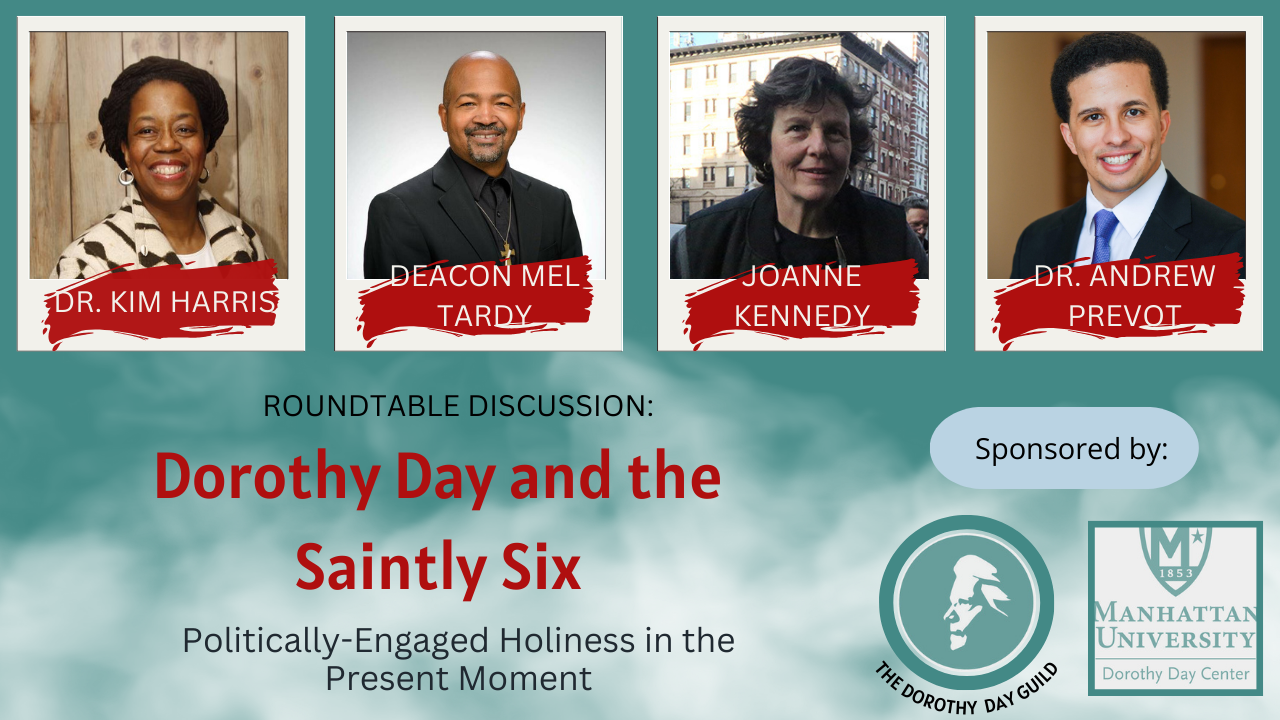
Article Round-up for the Month of Dorothy:
The month of November, bookended by Dorothy’s birthday and the anniversary of her death, always yields many thoughtful articles on the continuing significance of Dorothy’s life and witness in the contemporary Church. Several blogs and online magazines, including James Ford’s Monkey Mind on Patheos and The Collector included short introductions and reflections on Dorothy last month, as did a number of Catholic organizations and publications. On Dorothy’s anniversary, the National Shrine of Elizabeth Ann Seton published a piece by Kathryn Jean Lopez for their Seton Reflections series, “Dorothy Day and Elizabeth Ann Seton: New York Converts on First with the Love of Jesus,” which considers Dorothy’s daily reception of the sacraments as the fuel which enabled her decades of activism and the practice of the works of mercy. We join Lopez in her hopes that this anniversary will soon be celebrated as Dorothy’s feast day, and we give thanks for the gifts of devotion and fresh perspective that converts like Dorothy, Mother Elizabeth Ann Seton, and their fellow New Yorker, Mother Rose Hawthorne Lathrop have brought to our Church!
America featured three articles on Dorothy in the past several weeks. The first, “In Entertaining Angels, Dorothy Day reminds us that after an election, the real work begins,” published on her birthday, is a review of the 1996 biopic. Writing in the days following the US presidential election, John Dougherty writes,
“Day is an interesting figure to consider during election season. Despite marching for women’s suffrage (as depicted in the film) she never voted, skeptical of how much change could be achieved through political means. Early in the film, she tells a friend, ‘The masses need food, not manifestos.’ While I disagree with her on the value of voting, I agree with her larger point: If we took more responsibility for taking care of one another, maybe we wouldn’t need to rely so much on politicians.”
While this film is now almost thirty years old, Dorothy’s particular mode of political engagement remains as fresh and challenging as ever, and we appreciated the timeliness of this review. Dorothy’s firm moral convictions, grounded in the commitments of the Gospel, resist the reductive tendencies of partisan politics. Our political and ecclesial cultures can sometimes tempt us to divorce the works of mercy from the political sphere, as if the work of feeding the hungry was separate from the work of resisting war; Dorothy’s witness reminds us of their indivisibility.
We also appreciated Conor Hartigan’s scripture reflection, “A Lesson in Radical Love from Dorothy Day,” published the following week, and a new piece from Robert Ellsberg. Robert’s essay, “Dorothy Day didn’t want to be called a saint. She wanted to be one,” is adapted from his new anthology from Orbis Books, Dorothy Day: Spiritual Writings. Commenting on Dorothy’s refusal to participate in the civil defense drills during the Cold War, Robert writes,
“There were many who had initially admired her work among the poor. Among the original subscribers to her newspaper, founded in the heart of the Depression, there were also plenty who sympathized with her critique of an economic system that produced such poverty and desperation. Yet few in those early years joined Day in her conviction that the way of Jesus was incompatible with any kind of killing. On the day of that first civil defense drill, the number of Catholics in New York City who agreed that preparation for nuclear war was a crime against God and humanity could evidently fit inside a single police wagon.
And yet for Dorothy, it all went together. The Catholic Worker was an effort to live out the radical implications of the teaching of Christ: that what we do for the least of our brothers and sisters—whether feed them, shelter them or bomb them—we do directly for him.”
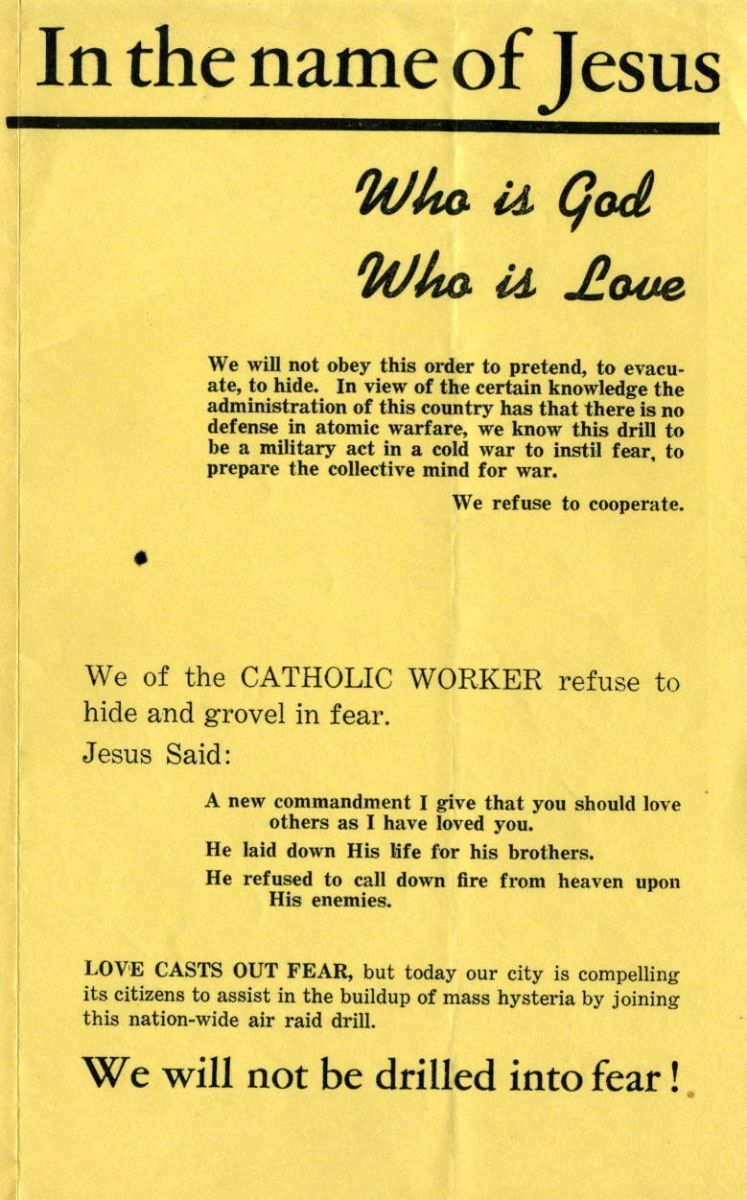
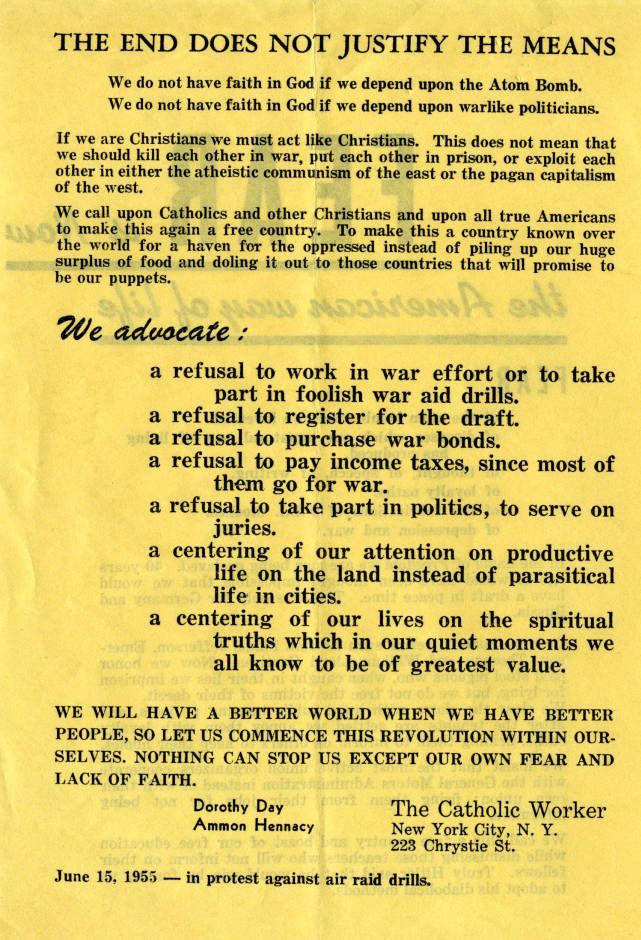
Dorothy’s commitment to responsible action in light of the daily demands of the world is not separate from or auxiliary to her spirituality. Her daily rosary, her Eucharistic devotion, her love for the saints, her intercession for members of her family and community, and her active resistance to war and economic violence are all of a piece. In Dorothy’s life and witness, we see the embodiment of the type of holiness she longed for prior to her conversion to the Catholic faith– a holiness which desired the hungry to be fed and an end to the social order which kept them in constant want. Dorothy didn’t want anyone to put her on a pedestal; she wanted all of us to accept the responsibility that the Gospel lays upon us. This is what it means to be holy: to integrate love for God and love for the neighbor in action that takes seriously our responsibilities to the poor and to history. It is in this that Dorothy’s spirituality is grounded, and it is through this that we hope and pray the Church will soon recognize Dorothy as one of Her saints.

We’d like to congratulate our friends at Commonweal who also celebrated an important anniversary last month– 100 years of lay leadership in publishing independent Catholic perspectives! Dorothy wrote many articles for Commonweal in her career as a journalist, and it was in fact an editor of the magazine, George Schuster, who suggested to Peter Maurin that he look Dorothy up in New York. The Catholic Worker movement owes its genesis in part to Commonweal. Patrick Jordan, a long-time advisor to the Dorothy Day Guild and former managing editor of both The Catholic Worker and Commonweal, wrote an article in honor of the anniversary detailing the continuing history of connection and collaboration between the two publications. Introducing his piece, the current editors of Commonweal note,
“Jordan writes that Commonweal and the Catholic Worker embody distinct but interconnected approaches to faith and public life. While the Catholic Worker emphasizes works of mercy and active resistance to war, Commonweal exemplifies freedom of thought in both the Church and the world. With their distinctive approaches, the two publications, both dynamic expressions of the American Catholic laity, have found common cause over the years in … supporting the pursuit of a common good.”
While the Catholic Worker movement might be locally more recognized for the various ways in which its members offer the corporal works of mercy or visibly oppose war and preparation for war in their communities, the movement began by publishing a newspaper. Dorothy believed that writing with integrity could be a spiritual work of mercy. She remained convinced that journalism, like protest, could instruct the ignorant, admonish the sinner, and counsel the doubting. The writers and editors of The Catholic Worker have continued this work into the present. As Pat states in his overview,
“The historian Charles R. Morris (at a later point a Commonweal columnist), wrote in his fine 1997 study of twentieth-century American Catholicism, American Catholic, that the ‘glue’ behind the success of the Catholic Worker movement was its publication, The Catholic Worker. Morris described the CW as ‘a professional, imaginatively laid out production from the very start’... Day, Morris opined, ‘wrote like an angel, in spare, limpid prose, with a pointillist’s eye for detail.’ As Commonweal’s Shuster observed, Day was perhaps ‘the most talented Catholic woman writer since Kate Chopin,’ who could have been ‘one of the most brilliant and influential of Commonweal’s editors.’ But, Shuster noted, Day chose to be more directly involved in the social issues of her times.”
We’re very grateful to our friends at both Commonweal and The Catholic Worker for their enduring commitment to the truth and the common good, both works of the Gospel. Pat’s article, originally published in the October/November issue of The Catholic Worker, is available here on the Commonweal website.
We’d like to close our round-up with two short offerings from National Catholic Reporter. Last month, Jeromiah Taylor wrote a recap and reflection on the Peter Maurin conference which took place in Chicago earlier in the fall. Commenting on the discussion during and after the roundtable he co-facilitated with Brian Terrell, Jeromiah states that his “main takeaway was that Gen Z Catholics are hardly apolitical, but do, at least in part, feel tactically underequipped and are hungry for a new repertoire of resistance for the digital age.” Peter’s rejection of reformist programs in favor of radical conversion is perhaps uniquely capable of speaking to young activists’ sense of hopeful urgency and their desires for the renewal of our world.
It’s been great to take part in the ongoing dialogue that this conference has generated, and we’ve been invigorated by some of the projects that have been inspired by Peter’s legacy. We know that Dorothy would be thrilled to see another generation of young Catholics and fellow seekers seriously engaging with the challenges to contemporary society issued by her friend and mentor, Peter.
To close this section, seeing Dorothy’s name pop up in the Francis comic strip last month was a treat! We join Friar Leo and Dorothy in praying for a world free of fear and want, in which it is easy to be good, and we trust that God sees and makes use of even our smallest and most mundane efforts to bring about His kingdom of justice and peace.
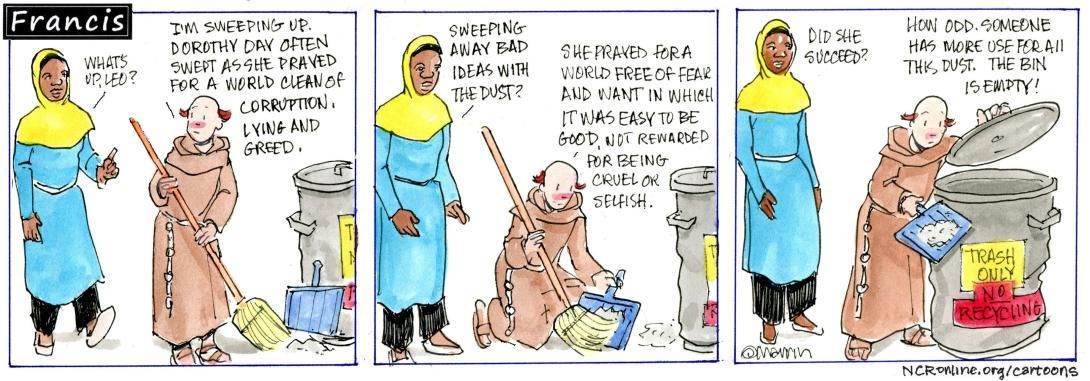
Additional Reading and Listening Recommendations for Christmas:
Many of you may be traveling in the coming days, by car, by plane, or perhaps as Dorothy frequently did, by Greyhound bus! For those who will be in transit this week and have some time for podcasts, we would like to share a fantastic new interview with Fr. John Dear from the Metta Center for Nonviolence, “The Gandhian roots of the Sermon on the Mount.” Fr. John has written and edited forty books on nonviolence and has often named Dorothy as an exemplar of discipleship in her practice of Jesus’ active pacifism. This conversation, which is available as both a transcript and an audio version, walks through the core of Jesus’ teachings on pacifism and nonviolent resistance in Matthew 5-7. Fr. John frames Jesus’ words to the gathered crowd not as a long homily or didactic lecture, but as a retreat centered around a classic training in active nonviolence. For Fr. John, the nonviolence preached by Jesus,
“Means a couple of basics. We’re not allowed to kill, Christians. You’re not allowed to kill anybody. And we don’t kill people who kill people to show that killing is wrong. The days of killing there are over.
And only from within the boundaries of nonviolence. Refusing to take up the gun, the sword, or build bombs or drop nuclear weapons or cultivate violence in any form, then can we practice the universal love and universal compassion and universal peace that Jesus taught.”
In the beatitudes, Jesus calls those who hunger and thirst for justice blessed, and promises that they will be fulfilled. Life-long engagement with that struggle for justice and engagement with the practices of nonviolence changes us; indeed, it is the only thing which will satisfy that hunger and slake that thirst. As Fr. John says,
“No, those who work for justice, the thousands that I have met, and if they go deep into nonviolence, you end up like Gandhi and Thich Nhat Hanh, and Dorothy Day. A real possessing a certain dignity, a certain deep peace and contentment, even an inner joy. And this fundamental meaning that no one can take.”
We highly encourage you to read or listen to this interview, and we join Fr. John Dear in his hope that Pope Francis will offer the Church an encyclical on nonviolence as the normative Christian ethic for addressing conflict.
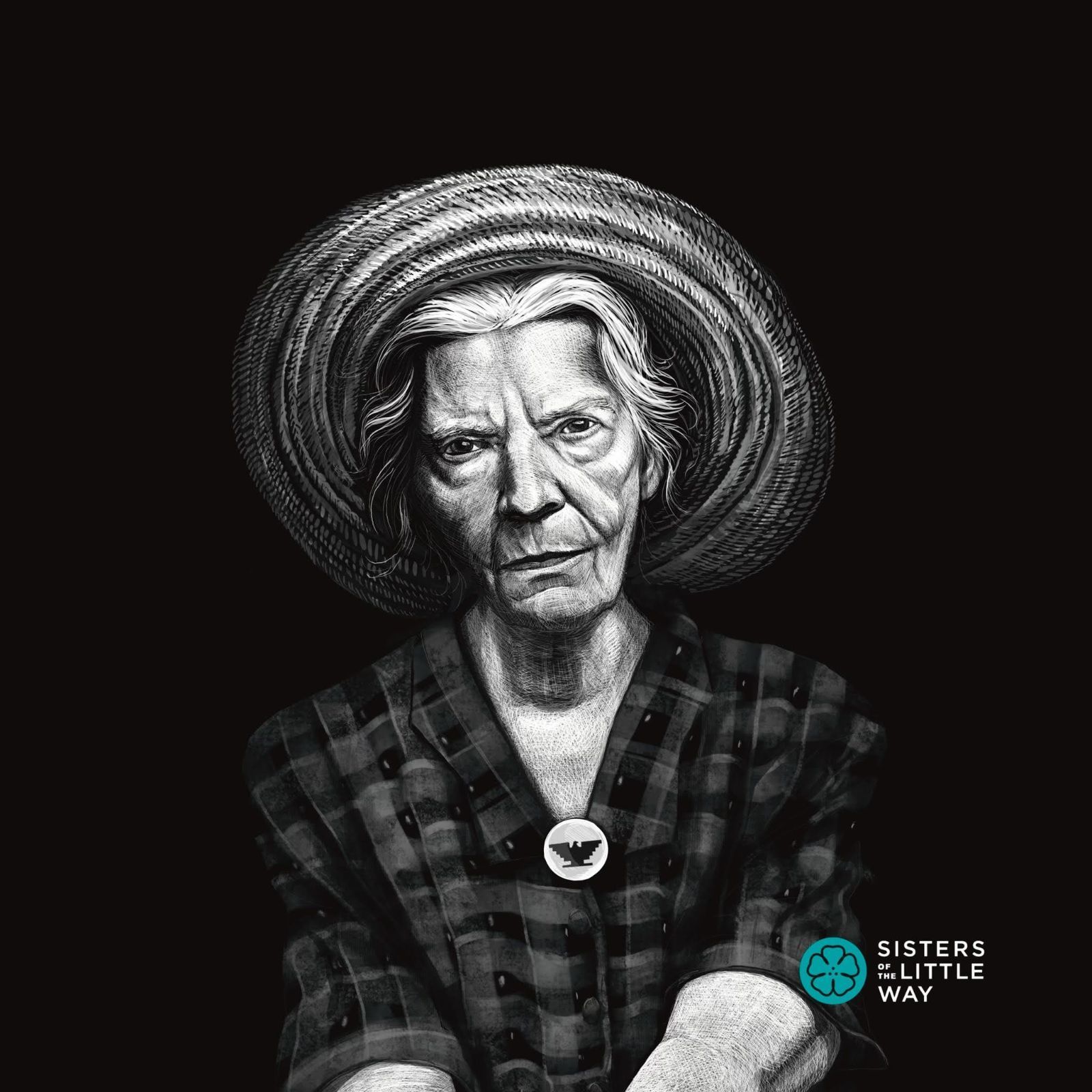
We would also like to share two additional articles, both of which in different ways concern truth-telling and integrity. Sister Theresa Aletheia Noble, a member of the newly-formed Sisters of the Little Way, recently published a new piece, “Dorothy Day and Systemic Realities,” on her community’s Substack, along with an arresting new portrait of Dorothy by Sister Danielle Victoria.
The sisters have chosen Dorothy as one of the patrons of their new congregation. Sister Theresa Aletheia and Sister Danielle Victoria are currently studying safeguarding, or abuse prevention in the Church at the Gregorian in Rome. Speaking on their decision to place the work of their community under Dorothy’s care, Sister Theresa Aletheia writes,
“Core to [Dorothy’s] thought and spirituality was the importance of not only addressing symptoms of poverty but in also exploring the systemic reality as to why poverty exists in certain contexts. In other words, Day recognized that not all sin is individual—it also can be systemic or structural. Dorothy herself applied this way of thinking to the Church, observing that systemic changes were needed not only in broader society but within the Church. When asked why there was a vocations crisis, Dorothy responded, ‘I think it’s a result of the corruption in the institutional Church, through money and through their acceptance of this lousy, rotten system.’ Of course, Dorothy was referring to the need for different systemic changes but her general idea of the need for ecclesial structural reform makes sense applied to our work as well.”
The Sisters of the Little Way of Beauty, Truth, and Goodness, are currently a private association of the faithful.
The three founding sisters were permitted by their bishop to take private vows in October of 2023, a first step in becoming officially recognized as a religious institute. The “About Us” section of their community website reads “As religious sisters and consecrated women, we live a mission of listening, healing, and reparation in solidarity with people on the fringes of the Church, especially those who have been wounded, scandalized, or abused by members of the Church.” We urge you to subscribe to the Sisters’ newsletter and to keep their community’s mission in your prayers this Christmas.
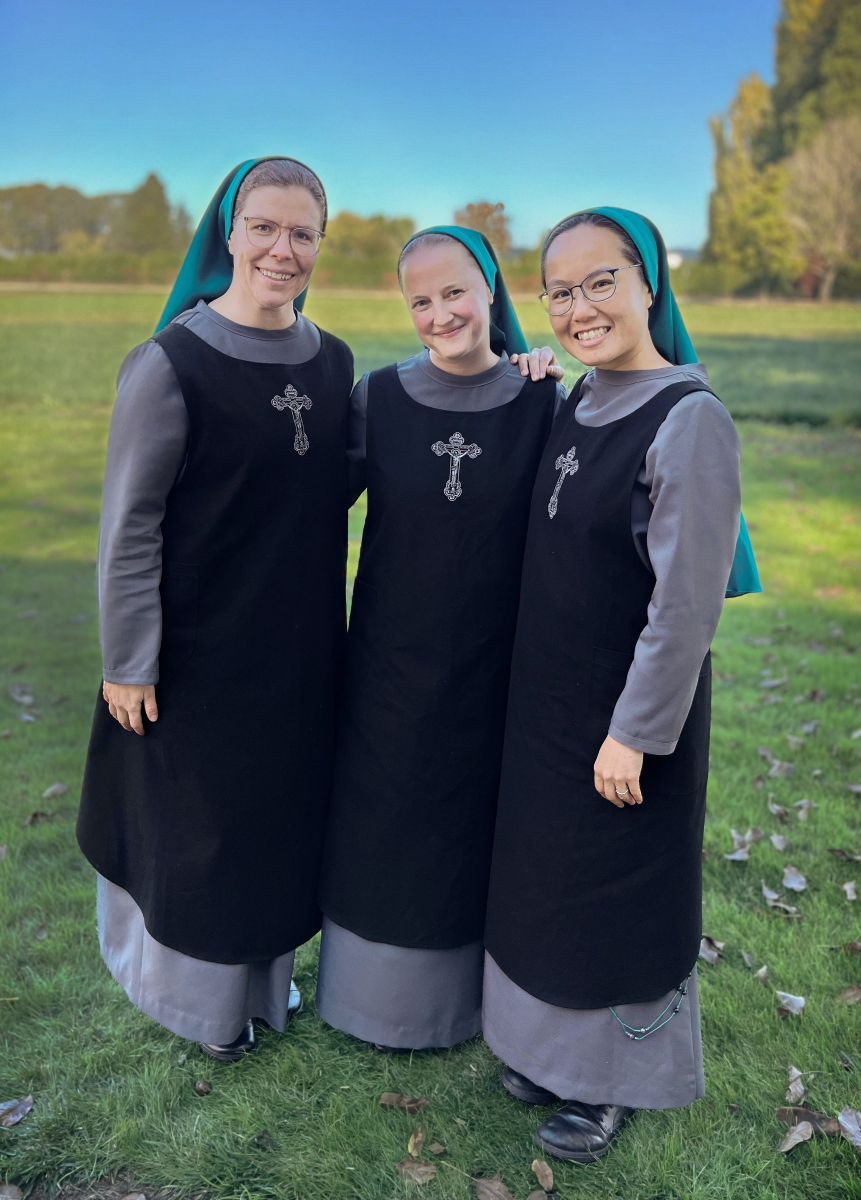
Finally, Dorothy’s deep love for the sacraments is well-documented, and those who knew her during her lifetime remember the peace and strength she drew from her daily reception of the Eucharist. In the years since her death, the memory of this devotion has evolved into hagiography, which at times distorts the details of historical events in order to gesture towards a point of theology or spirituality that the storyteller wishes to communicate through the life of the saint. One of the Dorothy-stories that has been passed around over the years is a story about what happened when a priest celebrated mass at the Catholic Worker in New York using an ordinary ceramic cup in lieu of a chalice. This process of crafting a devotional narrative is a common feature in the stories we pass on about the saints, the members of our family who have gone before us in Christ; however, one of the incredible gifts of our time is our proximity to Dorothy in history. Brian Terrell, who lived at the Catholic Worker in New York in the 1970s, remembers Dorothy’s Eucharistic devotion clearly, even though by Dorothy’s own account, she was out of town when the 1966 “Coffee Cup Mass” was celebrated and could not have therefore have disposed of the make-shift chalice afterwards.
In a recent piece for the Catholic Worker movement website, “What the Myth of the Coffee Cup Mass Gets Wrong– and Why It Matters,” Brian tells us, “When I knew Dorothy in the five years before her death, every celebration of the Mass we attended together in our houses was as informal as it was reverent.” Dorothy loved the aesthetic grandeur of the high mass, with its beautiful chants and vestments, and she also loved the modest celebrations of the Eucharist which took place in the community’s houses of hospitality. In either case, Jesus was fully present.
Dorothy is close to us in time. Some of you knew her well; many of you met her once or twice and remember and cherish those encounters. Others of us missed her by a decade or a generation, but we’ve come to know and love her through her writing, through the ongoing witness of the Catholic Worker movement, and through the living memories of those of you who knew her in life. Dorothy is a holy figure, a member of the Church universal whom we believe is now interceding for us in heaven, but she is also a real person, as are all the saints. She was a woman with her own particularities, preferences, and interests, and as a journalist and a Catholic, we know that she was dedicated to the promotion of truth. Loving Dorothy and cultivating a spiritual friendship with her means respecting her integrity. One way we can do this is by sharing true stories about Dorothy, and developing an account of her biography and spirituality which honors her deepest commitments and the historical events of her life, big and small. We thank Brian for his work to correct the record on this narrative and point us towards the heart of Dorothy’s faith: the person of Jesus, found in the bread and wine of the Eucharist, and in the faces of the poor.
Books and reviews:
All of us at the Guild have enjoyed sharing the number of new books published on Dorothy in recent months, and it’s been great to see other publications taking note of them as well. If you still need one or two very last-minute Christmas gifts, keep reading!
National Catholic Register jointly reviewed Colin Miller’s We Are Only Saved Together and Jeff Korgen’s Dorothy Day: Radical Devotion last month. Rosalie Riegle also reviewed Robert Ellsberg’s anthology, Dorothy Day: Spiritual Writings for CatholicWorker.org, finding it inspiring and fresh in its organization. Rosalie writes this new collection of Dorothy’s writings finally broke open for her the deep connection Dorothy felt with St. Thérèse of Lisieux, whose “Little Way” helped Dorothy understand the significance of the tiny acts of love and fidelity offered in houses of hospitality, picket lines, and jail.
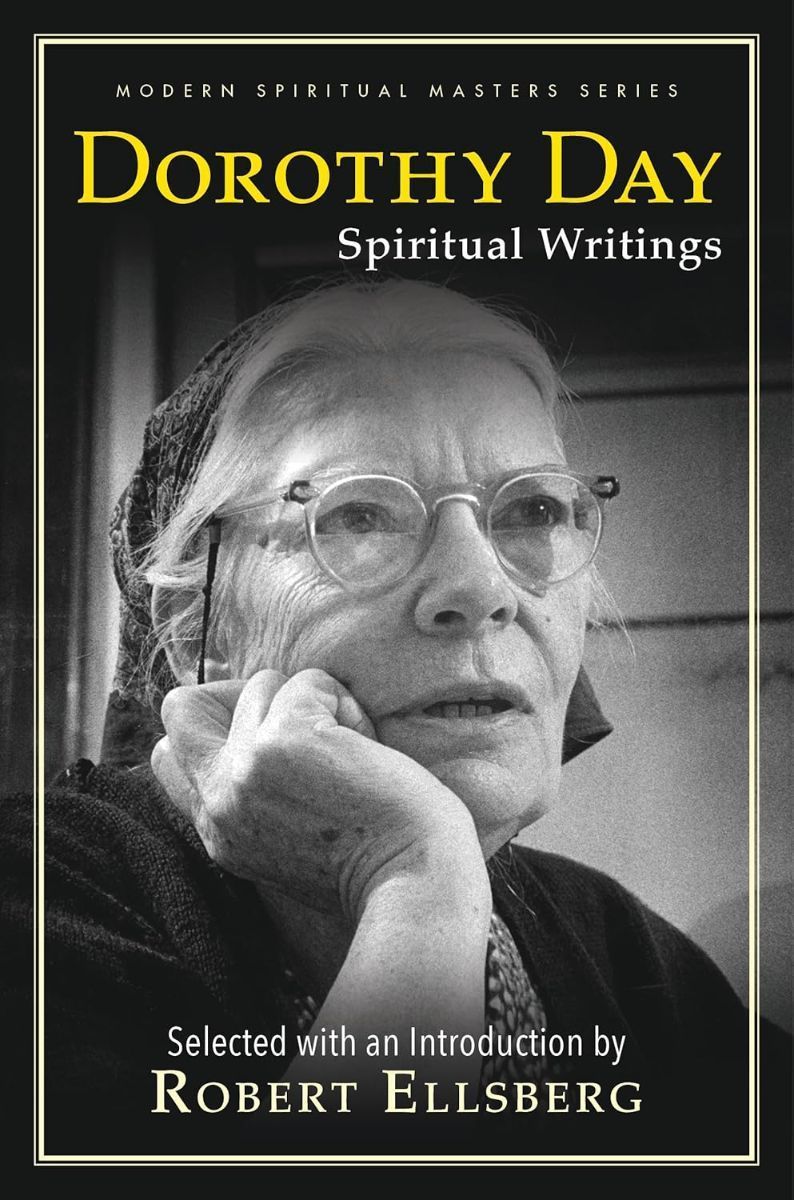
“Dorothy Day changed my life! In fact, she’s still changing it, many years later. Dorothy Day: Spiritual Writings… changed it still further,” Rosalie says. “I was struck by [Dorothy’s] frequent references to the book she wrote about St. Thérèse of Lisieux. I confess I had never before considered it, as I didn’t see what she and Dorothy Day had in common, but this time, it hit me!” To hear Robert speak directly about the themes of the book, including Dorothy’s unique retrieval of the Little Way in the social sphere, check out Orbis Books’ most recent One-on-One episode.
Christianity Today recently released their annual book awards picks, and included Alex Sosler’s A Short Guide to Spiritual Formation: Finding Life in Truth, Goodness, Beauty, and Community as the winner in their Christian Living/Spiritual Formation category. Sosler names Dorothy as an exemplar in the pursuit of holiness alongside St. Augustine, St. Teresa of Avila, and Dietrich Bonhoeffer. Dorothy points us towards a vision of Gospel-centered life which extends beyond denominational boundaries, and we’re excited to see the ways in which her legacy appeals to our evangelical brothers and sisters.
Last but not least, in 1966, Dorothy wrote a series of luminous Advent reflections for Ave Maria magazine. Dorothy took this opportunity to engage the evangelical counsels in her own context, writing the first week on “Searching for Christ,” and following it with reflections on poverty, chastity, and obedience. In the final reflection for the fourth week of Advent, “Obedience,” Dorothy writes about the challenge this concept holds out to the entire Church, but especially to members of the laity. For Dorothy, obedience was inflected by the resonance of other concepts: love, freedom, and responsibility. Dorothy recalls a meeting that took place in the early days of the Catholic Worker movement, when Bishop O’Hara of Kansas City tasked Peter Maurin with “leading the way” in order that the hierarchy might follow, writing that,
“Peter knew what he meant. He meant that it was up to the laity to be in the vanguard, to live in the midst of the battle, to live in the world which God so loved that He sent His only begotten Son to us to show us how to live and to die, to meet that last great enemy, Death. We were to explore the paths of what was possible, to find concordances with our opponents, to seek for the common good, to try to work with all men of goodwill, and to trust all men too, and to believe in that goodwill, and to forgive our own failures and those of others seventy times seventy times. We could venture where priest and prelate could not or ought not, in political and economic fields. We could make mistakes without too great harm, we could retrace our steps, start over again in this attempt to build a new society within the shell of the old, as Peter and the old radicals (those who went to the roots of things) used to say.
I speak of these incidents to show the tremendous freedom there is in the Church, a freedom most cradle Catholics do not seem to know they possess.”
Obedience, for Dorothy, was first and foremost obedience to conscience, where the voice of God speaks to our hearts and invites us to follow freely. We love these reflections for the Christmas season as well as these last days of preparation and anticipation. Reflections During Advent can be read in full on the Catholic Worker movement website and has also been compiled by Ave Maria Press as an ebook available for purchase.
Dorothy in Translation:
In other news, we are so excited to share the news of two new translation projects. Alva Dahl and Joshua Armfield, members of the Mustard Seed Catholic Worker in Sweden, have assembled an introductory volume of Dorothy’s writings translated into Swedish. Alva and Joshua have offered their work in hope that Christians in Sweden will find in Dorothy an example of authentic faith in action.
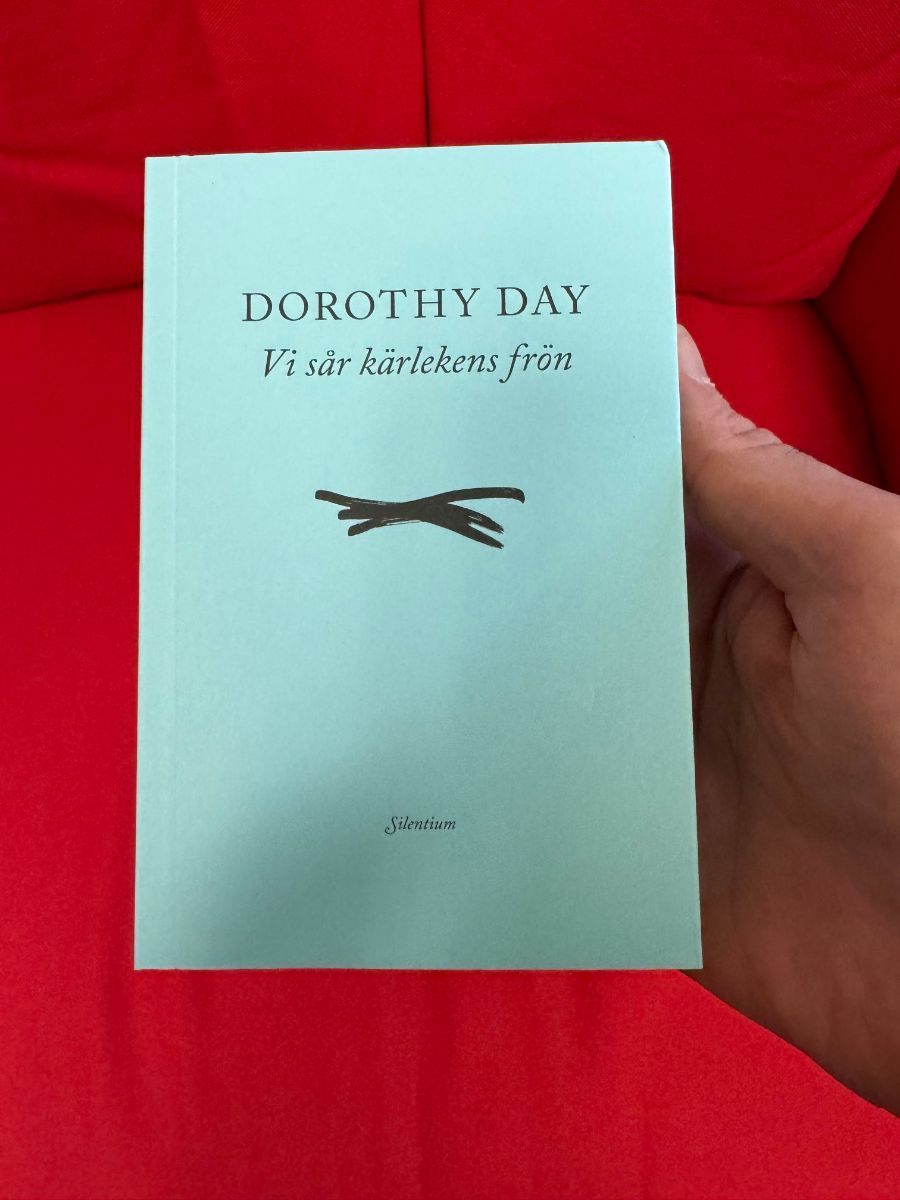
Their new anthology, Vi sår kärlekens frön av Dorothy Day, is published by Silentium.
Magdalena Muñoz Pizzulic, a member of the St. Peter Claver Catholic Worker community in South Bend, has also begun translating a number of Dorothy’s best-known columns into Spanish. Magdalena tells us that Dorothy offers an important corrective to both individualist forms of organization which deny the reality of the common good and collectivist political structures which demote the personal subject below the masses and in doing so, makes a unique contribution to liberation theology. In her conversion, Dorothy moved away from hierarchical political structures and recovered a concept of communitarian social organization where the human person “can be cherished for all of her needs and gifts.”
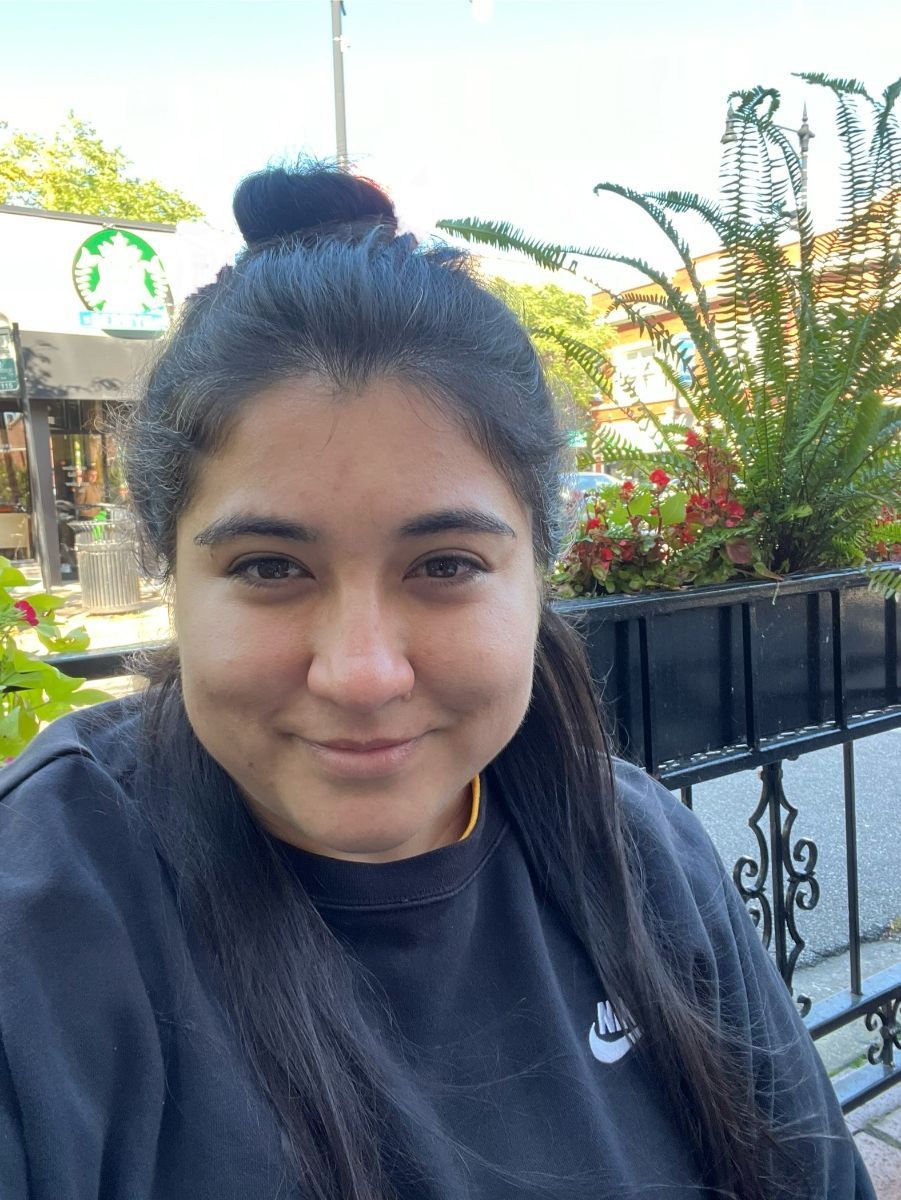
Magdalena previously translated the Dorothy Day Guild website for us and is now engaged in the project of making Dorothy’s writing accessible to Spanish-speaking Christian communities and the wide network of Latin American liberation theologians and their conversation partners. The first three articles in translation, “Pobreza es el Rostro de Cristo” (“Poverty is the Face of Christ”) and “Casas de Hospitalidad,” (“Houses of Hospitality”), and “La Larga Soledad,” (“The Long Loneliness”) are available on the Catholic Worker movement website.
Keep an eye out for additional articles translated into Spanish in the weeks ahead!
As we look forward to the next stage of Dorothy’s canonization process, we remember that the Church is a global community. When Dorothy is, God willing, eventually canonized, she will not be a saint only for New York, or only for the United States, but for the Church universal. Many thanks to Alva, Joshua, and Magdalena for their generosity and skill, which have made Dorothy’s legacy of nonviolence, voluntary poverty, and hospitality legible to more and more of our brothers and sisters in Christ.
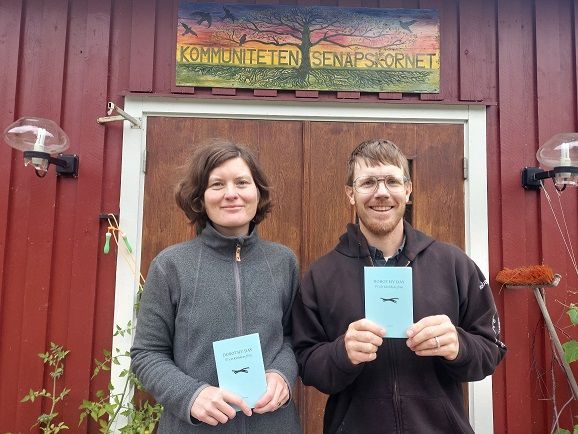
A few words from Dorothy:
In the decade-plus that I have been a member of the Catholic Worker movement, I have had many opportunities to engage with Dorothy’s writing in both devotional and academic contexts. I am also fortunate enough to teach several graduate and undergraduate courses on Dorothy and the Worker, and each semester, I am faced with the question of which of her books and articles to assign to the class. Choosing a favorite text of Dorothy’s would be an almost impossible task, but if it really came down to it and I were forced to pick just one, it would be her 1945 Christmas column, “Room for Christ.” Speaking on the Incarnation and the cosmic significance of the works of mercy, Dorothy writes,
“It is no use to say that we are born two thousand years too late to give room to Christ. Nor will those who live at the end of the world have been born too late. Christ is always with us, always asking for room in our hearts.
But now it is with the voice of our contemporaries that he speaks, with the eyes of store clerks, factory workers and children that he gazes; with the hands of office workers, slum dwellers and suburban housewives that he gives. It is with the feet of soldiers and tramps that he walks, and with the heart of anyone in need that he longs for shelter. And giving shelter or food to anyone who asks for it, or needs it, is giving it to Christ.
We can do now what those who knew Him in the days of His flesh did. I’m sure that the shepherds did not adore and then go away to leave Mary and her Child in the stable, but somehow found them room, even though what they had to offer might have been primitive enough. All that the friends of Christ did in His life-time for Him we can do.”
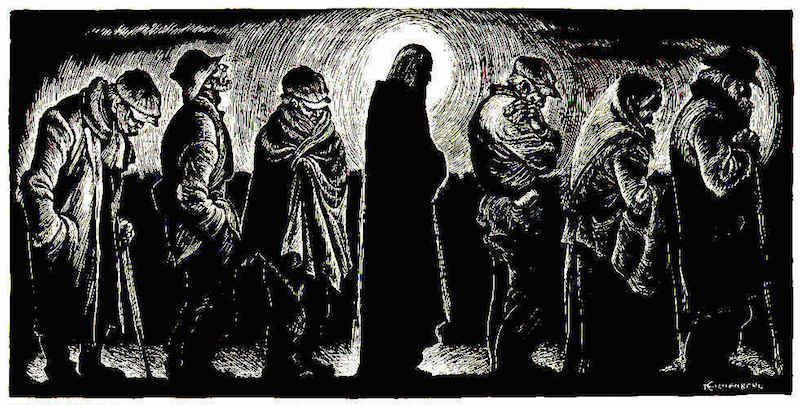
In the epilogue to Jesus of Nazareth, Pope Benedict XVI spoke about the three-fold coming of Christ described by St. Bernard of Clairvaux. St. Bernard explains that Christ first came “in flesh and in weakness,” as the Infant born in Bethlehem and that at the end of time, he will come again “in glory and majesty.” The season of Advent prepares us for this coming as well. But in between these two great moments, Christ also comes to us “in the spirit and in power.” This middle time, the present, is not empty, and our waiting for Christ is not passivity, but active readiness. Benedict writes,
“This ‘middle coming’ takes place in a great variety of ways… [Christ] also comes in ways that change the world. The ministry of the two great figures Francis and Dominic in the twelfth and thirteenth centuries was one way in which Christ entered anew into history, communicating his word and his love with fresh vigor. It was one way in which he renewed his Church and drew history toward himself. We could say much the same of the saints of the sixteenth century. Teresa of Avila, John of the Cross, Ignatius Loyola, and Francis Xavier all opened up new ways for the Lord to enter into the confused history of their century as it was pulling away from him. His mystery, his figure enters anew– and most importantly, his power to transform lives and to refashion history becomes present in a new way.”
Dorothy tells us that we are not too late to give room to Christ, and she is right. Christ is always ready to meet us in the poor, the unhoused, the victims of war and violence, and so Christ is always ready to enter into our hearts if we are willing to make room. Christ is still meeting us in flesh and in weakness, and we are privileged to offer him hospitality. But Christ also now comes to us in the spirit and in power and in ways that change the world. If Christ entered into history through the great saints of the past, like Francis and John and Teresa, in our own time he has entered through Dorothy, and through her life and her ministry has renewed the Church. Christ speaks to us through the saints: as Dorothy says in this column, “If we hadn’t got Christ’s own words for it, it would seem raving lunacy to believe that if I offer a bed and food and hospitality for Christmas…I am replaying the part of Lazarus or Martha or Mary and that my guest is Christ.”
We do have Christ’s word for it, and here again he speaks to us through Dorothy’s monthly column in The Catholic Worker. “In Christ’s human life there were always a few who made up for the neglect of the crowd,” Dorothy reminds us.
“The shepherds did it, their hurrying to the crib atoned for the people who would flee from Christ. The wise men did it; their journey across the world made up for those who refused to stir one hand’s breadth from the routine of their lives to go to Christ… We can do it too, exactly as they did. We are not born too late. We do it by seeing Christ and serving Christ in friends and strangers, in everyone we come in contact with.
The Gospel is re-presented in the newspaper office and on the soup line, as real and alive today as it was in New York in 1945 and two thousand years ago in Bethlehem. As we prepare once again to welcome Jesus in the Incarnation, we pray that you will receive the Word of God in all its freshness and vigor, and that this Christmas, you too will answer a knock at the door of your home and of your heart and give room to Christ.
In peace,
Dr. Casey Mullaney, on behalf of the Dorothy Day Guild
Share this post

